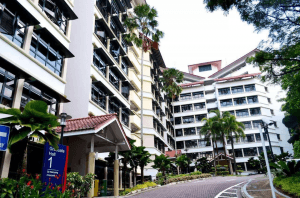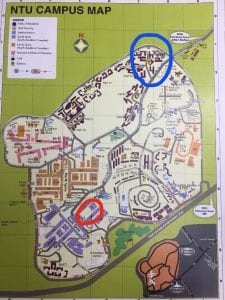Graduate Studies Blog

Article written by: Zhang Yiwen (MFE Participant 2017-18)
The main reason I’m writing this is that most people in China do not know much about financial engineering, but recently many have asked me about Nanyang Technological University’s MSc. Financial Engineering (NTU or NTU MFE). So I’m here to summarize and share my own experience studying NTU MFE for your reference. It is purely personal and may not apply to everyone. You may judge according to your own circumstances. My hope is that it provides some convenience for those interested in working in finance or applying for a spot in NTU.
If you prefer a glimpse rather than reading, please check out the Nanyang MFE site.
(Make sure you read this article in a WiFi-equipped environment because there will be a lot of pictures.)
To start with, I’d like to say something about myself. I’m a full-time MFE graduate at NTU. I used to be an engineering student at a Shanghai university of Project 985.
Now comes the question: How does it feel studying MFE at NTU?
The NTU boasts a really beautiful environment. Just take a look at the following pictures (provided by NTU Graduate Student Council).

Fig.5 Student Dormitory (Buildings for students aplenty, with a pleasant environment. No need to rent a place like NUS students.)
Part1: Financial Engineering
-
- Financial Engineering has gained popularity in recent years. It involves mathematics, finance and computer science. Applicants are required of a good command of such knowledge. Similar to Mathematical Finance, Financial Engineering and Quantitative Finance, Financial Engineering deals with financial issues through computer programming. As a cross-disciplinary program, it is often jointly taught by teachers from the schools of business, mathematics and computer science. The teaching content is harder than that of the general Finance and MBA courses. It mainly includes stock market analysis, asset pricing, capital budgeting, fixed-income analysis, interest rate model and financial risk management (NTU’s curriculum will be discussed in Part 3). The founding of NTU MFE was also a joint effort of Nanyang Business School (NBS) and School of Physical and Mathematical Sciences (SPMS).
- As to employment, the quantitative area is a top choice, but MFE graduates may choose to work in any area related to finance. To my knowledge, the average salary of MFE graduates is pretty good.
Part2: NTU NBS
-
- NTU MFE was jointly established by NBS and SPMS, but it is under NBS at the administrative level. Nanyang Business School ranked 24th in the world (Financial Times 2017) with reliable teaching quality.
- NBS is near Hive. It has three teaching buildings as circled in red. The dormitory I live is circled in blue. It seems quite a long distance, but we have shuttle buses (three loop lines altogether), running every 5 minutes. It takes 10 minutes from the dorm to the teaching building. So it is really convenient. NBS has its own library (see Fig. 3.4). It’s a well-stocked library that offers study rooms, discussion rooms and computer rooms. The teaching buildings also have study rooms that are always open to MFE students (with printers, Bloomberg Terminals and computers). Everything is awesome. Seeing is believing!
Part3: NTU MFE
- In terms of curriculum, you may just look at my class schedule. NTU MFE is a three-trimester program. Each trimester is divided into two minis. Each mini lasts about 7 weeks. Of the courses those marked by (E) are elective ones and the rest are required ones. The curriculum is designed in an easy-to-difficult way. It helps you lay a very solid foundation in finance.
One thing to note is that almost all NTU’s programming courses are taught at CMU! I bet you all know CMU’s School of Computer Science and its global ranking. Awesome indeed! The last mini of NTU MFE will be also spent at CMU. My seniors say Mini 6 will be crammed with quality programming courses from which one will learn a great deal.

2. About employment, NTU and NUS graduates won’t worry about finding a job in Singapore. It is learned that NUS MFE graduates would choose risk management while NTU MFE graduates mostly go for quantitative trading. (Only personal knowledge, not 100% authentic)
3. What are the requirements for application? As is clearly stated in the above site, a language test report, a GRE or GMAT report and a series of materials are required for application. The only thing to note is that the application materials should be sent to the Admissions’ mailbox.
4. As for the interview that follows, applicants will be asked to have an interview via Skype once the resume meets the requirements. There will be some math questions during the interview for which you may prepare. In this regard, reference articles abound.
Part4: Life at NTU (learning, recreation and traffic)
- You have nine libraries at your disposal. And there are all-night study rooms outside your dormitory, as well as recreation areas and discussion areas. NTU also has online databases where you can check homework assignment, submission and curriculum information.
- Almost every dormitory area is equipped with a free-of-charge gym. There are also swimming pools, badminton courts, basketball courts and tennis courts in the campus. Near Lee Wee Nam Library is a comprehensive shopping center, comprising a bank, a supermarket, milk tea shops, a food court, etc., all for your convenience. There is even a huge display screen in front of the supermarket that sometimes acts as an open cinema. The movie information will be delivered to the school’s mailbox.
- Traffic is also great. You can take Line 179 or 199 to the metro station where there are a real cinema and a one-stop shopping center to meet your daily life needs. NTU is very close to Malaysia, only 30 minutes’ ride. You can get a multiple entry visa and spend your weekends there. If you’re buying something, you may try Yue Hwa Chinese Products and Chinese Goods Supermarket (中商超). They will have your products delivered to your dormitory.
PS: Many say their biggest concern about studying in Singapore is the language issue out of an understanding that people in Singapore speak Chinese and that won’t help their English. This is absolutely a misunderstanding! In fact, the locals won’t speak Chinese to you, and they even have difficulty in understanding Chinese! No need to worry that you won’t have any chance practicing English. But the good news is that service workers understand Chinese in Singapore, such as in restaurants and shopping malls. So don’t worry about the menu problem.
So much for today, I may update this from time to time. And the last thing: You are welcome to join NTU MFE!
Download MSc Financial Engineering Brochure







You must be logged in to post a comment.